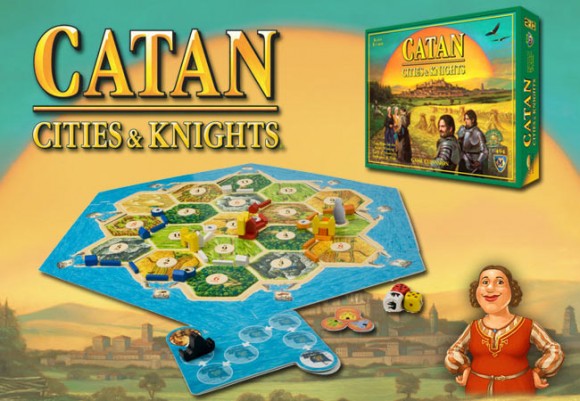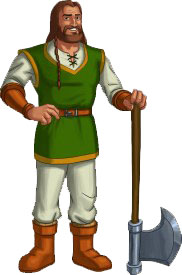
It should come as no surprise that I have some disagreements with "the almost-complete Strategy Guide" presented in this site by Alex Pomeranz. Everyone plays the game differently and therefore there are different dynamics to playing the game with almost each group.
Whereas his tips are meant to be "general" and thus without all that much weight, his overall assessment of the value of particular resources and such could be considered more specific and unchangeable, and those are what I'll discuss.
Strategies
As in most strategy games, the rules of the game, as you play them, eventually give rise to a few strategic approaches that are most conducive to wins. Cities and Knights of Catan is no different.
In the basic Settlers game, two of the most powerful approaches are Brick/Wood and Ore/Wheat strategies, concentrating on two of the 5 resources with an aim for a specific approach.
There's also the situational Resource/Port strategy and the generic "All Resources" strategy. I'll be attempting to outline some of my strategic approaches to the game.
Sheep/cloth

This is one of the more unusual and successful strategies I've encountered in Cities and Knights. Essentially, the point of this strategy is to maximize early production of Cloth, with a continued emphasis in the mid and late game.
The crux of this strategy depends on two things: Trading House and Merchant:Sheep. Trading House allows you to basically transform any two Cloths into anything else, and Merchant:Sheep which you get from your yellow progress cards allows you to parlay your Sheep into whatever else you may need.
The virtually assured capability to transform and acquire anything you need for a slight premium (two for one) on your most common resource and commodity is what gives the strategy its solid backbone.
Of course, you can trade and use your Sheep for other things, also.
What gives the strategy real teeth is the yellow progress cards: Resource Monopoly, Trade Monopoly, and Commercial Harbor. Since winning consistently requires you to use these cards extensively, you will need to keep a close track of what everybody on the table is holding.
The strength of these cards is that they strengthen you while simultaneously weakening your rivals. It's like getting a green and a blue effect in one. The weakness in this strategy is that it depends on progress cards, a luck factor which may or may not go your way.
Variations: The Merchant:X Strategy is essentially what Sheep/Cloth is all about. With a little tweaking, you could easily adopt it into a Merchant:Brick focus or a Merchant:Wheat focus. If you have access, you could also feed your Sheep or Brick or Wheat into an available Port, which will free your Merchant for some other resource.
The most powerful thing about the Merchant:X strategy is its capability to go after multiple lines for Metropolis early and with strength. Two Metropolises is not a difficult thing to acquire, even if you only have tiles for producing Cloth.
Defender Of Catan

The main goal of this strategy is to get lots of ore and coin and then proceed to dominate the military strength of Catan for the Defender Points.
Since the strategy depends on getting lots of Ore and Wheat, you could say that this is something of a variation on the Ore/Wheat strategy for the basic game, although you won't raise multiple cities quite so dramatically, since you only produce 1 ore per tile, even if you have a city on it.
Bear in mind that you'll need Sheep in plentiful amounts to upgrade your Knights to Mighty, preferably with Basic Knight support for that occasional Deserter card. You'll also need small amounts of wood and brick, for creating roads for your Knights to populate. If you can steal a Smith card from a rival player for upgrading your Knights, that would be best.
The main strength of this strategy is that there isn't a lot your rivals can do to stop you. Once you get the strength of your army up to a considerable number, it's practically assured that you get one point every time the Barbarian comes to visit - points that no one can take from you.
A secondary strength is that you control the military of Catan. If someone irritates you, you can decide to let those fat merchant cities fend for themselves. Knocking three rival cities back into Settlements can be a winning blow.
Of course, the Political Metropolis also helps in getting to magic number 13.
Wood/aqueduct

The Aqueduct is widely touted to be the most powerful Progress ability in the game. I happen to think that the Trading House is more powerful, but the Aqueduct can be used to powerful effect, if you know what you're doing.
The Wood/Aqueduct strategy focuses on Paper production and clustering your settlements around a few numbers for best effect. This way, you either get large numbers of wood or paper and whatever else, or you get your pick of resource.
You might also want to secure a steady supply of Bricks, since Walls will make your large windfalls less susceptible to Robbers, and Bricks will also give you something to do with any excess Wood.
The main effect that gives this strategy viability is early game growth. You could say that it's the "rush" strategy of Cities and Knights. With the capability to dictate whatever resource you require, you have the ability to grow very fast compared to players using other strategies. The Green cards also help this potential right along.
The weak point of this strategy is that you need the Aqueduct online before you can sustain streaks of non-productive rolls, so in that respect, it's a bit of gamble. If your numbers don't come up, your game could be over before it's even begun.
It's possible to combine an Aqueduct with an early placement that spreads your numbers, but if you do so, you're quite likely to have a mid-game number spread so wide that you hardly ever use your Aqueduct at all. Probability management is essential in optimally leveraging the Aqueduct to best effect.
Observations

Points are bad
Unless you're about to win, things that give you points generally make your position weaker. Not only do people take note of you and may embargo you, lots of really powerful cards in the game can only be used against people who have more of something, usually points.
Commodities count
Commodities are rarer than resources, and in most cases, are much more powerful because they allow you to get progress cards and eventually gain points. Commodity spread is often more important than resource spread, or at least on par.
Walls count
Lots of newbies don't realize how powerful City Walls are in the game. To make my point dramatically, I'll ask you to do this: the next time you play, count the number of times in one game that you have to discard from a Robber. City Walls generates that much resources for you by saving them.
More importantly, City Walls allows you to hoard cards. With 3 City Walls, your maximum hand size increases to 11. This is hugely important later in the game, as you store three, four, or five commodities in your hand for upgrading your cities, even while trying to hold onto your "normal" complement of resources.
People without Walls will quickly note in the mid-game how much of an advantage they suffer against someone who invests wisely in Walls.
Resource supply is important
You will want to secure a reliable sourcing for all 5 resources by mid-game, or you could be fatally susceptible to embargo. The most common way to accomplish this is with a good major in the trade arm of city development for the Merchant card and Trading House, or by accessing a port, preferably of the 2:1 kind if you have major production of one resource, or the 3:1 kind if you don't.
Space is situational
Unlike the basic game, you don't really need a lot of settlements or cities or even the Longest Road to win. I've won with just 2 cities and 2 settlements.
Having less cities and settlements means you have less points, and thus appear less on the radar and aren't vulnerable to nasty things like Master Merchant; and you don't invest as much in roads. If you decide to spread out and suffer the point increase, make sure you have a good plan, since it exposes you to attack.
Non settlement points are big
As a corollary to the above, points that don't come from settlements on the board are usually pretty big. The most common ones are Defender of Catan, Printing Press, Constitution, Longest Road and the Metropolises.
The main reason why they're huge is because they can be gained with alacrity, which means that they can be reservoirs of "virtual points" that you only exercise when you're assured of a steady and sure path to victory.
Turn 8
The most points I've ever seen gained in one turn is 8. One for Constitution, two for Longest Road, two for Blue Metropolis, two for Green Metropolis, plus one settlement.
Yes, he instantly won from a position of 5 points - two Cities with City Walls, plus one settlement and four connected roads. This is unusual, however. Usually, people win from a position of between 6 and 11 points, with 7-9 points being the usual winners.
Trading Ports are important
Moreso than in the basic game, Wheat, Brick, Sheep, and Wood ports are positions of power. Ore is less important. One hardly ever gets to use such a port.
The most important reason why ports are so important (especially starting position ports) is because you can use them to get commodities you're short of, meaning you can manage with a smaller hand size, and you get progress flips and progress cards faster. There are many notable situations where an initial City placement on a Port proved to be winning, in some cases even unstoppable.
Continue Reading


